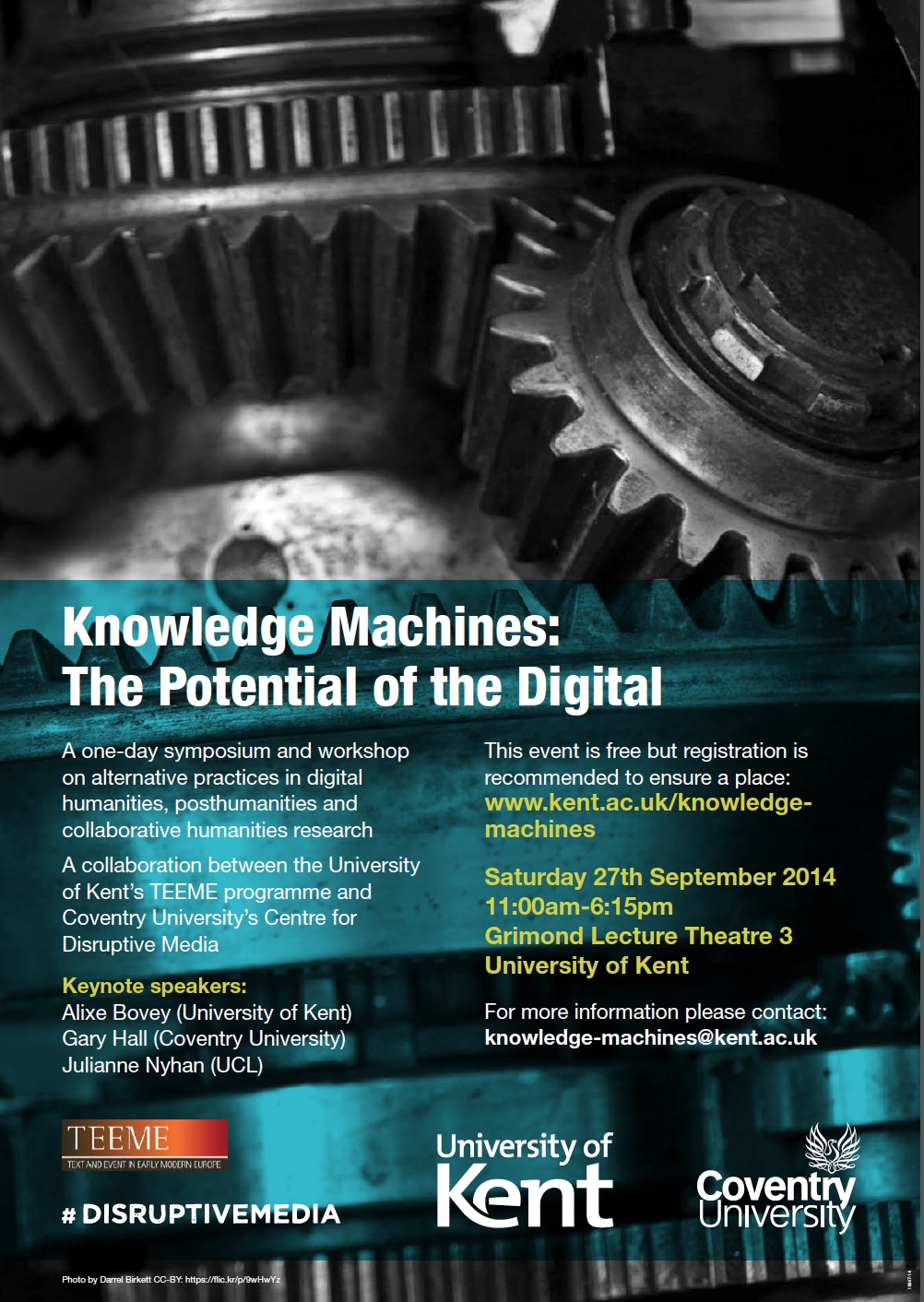TEEME and The Centre for Disruptive Media present:
Knowledge Machines: The Potential of the Digital. A symposium on alternative practices in humanities research
Saturday, 27 September 2014 from 11:00 to 18:15
University of Kent
Grimond Lecture Theatre 3
Grimond Building
CT2 7NZ Canterbury
United Kingdom
http://www.kent.ac.uk/knowledge-machines
Registration:
http://www.knowledgemachines.eventbrite.co.uk/
Knowledge Machines is a free one-day symposium which will showcase different approaches to using digital methodologies for the humanities. Videos, discussion points, and related materials will also be made available before and after the day on this website’s blog, in order to move the discussion about the future of the humanities out of the usual confines of the conference hall, and into the digital sphere.
Keynote Speakers
[Collaborative Humanities] Alixe Bovey: Senior Lecturer at the University of Kent who specialises in the visual culture of the later Middle Ages. Alixe has been the director of the University’s Centre for Medieval and Early Modern Studies, and runs a PhD skills training programme Material Witness
[Posthumanities] Gary Hall: Professor of Media and Performing Arts in the School of Art and Design at Coventry University and Director of the Centre for Disruptive Media
[Digital Humanities] Julianne Nyhan: Lecturer in Digital Information Studies at UCL Centre for Digital Humanities, specialising in oral history and digital humanities
Enabling affirmative and interdisciplinary epistemologies for an unfolding Humanities
Even in today’s market-driven education system where a commonplace (self-) diagnosis for the humanities is that its condition is critical, the knowledge machines are far from broken. Socially relevant knowledge is produced, disseminated and consumed in a variety of creative ways, in which digital tools and methodologies increasingly play an important role. The question remains, how can the humanities, through the digital, or the digital with the aid of humanities critique, act as a disruptive (political) force? In what sense can the digital humanities aid in reinterpreting the humanities (in a continuous process that stretches beyond the digital)? In order to establish where the importance of experimental digital work for humanities scholarship lies, this symposium wants to explore how we can use digital tools and technologies in a critical way to enhance and improve our scholarly practices and our communication systems. Through the digital we have the opportunity to critically investigate and question the value of our established institutions and practices and, vice versa, through critique we can analyse and transform the digital to make it abide to a more progressive and open ethics and value system.
Although old systems and epistemologies inherited from humanist practices are persisting, they are also mutating and changing, and scholars are creating new models of thought and practice. We are faced with a posthuman condition; one that de-centres man as a measure of all things and calls into question the antagonism between the given and the constructed, between nature and culture. The posthuman, theorized as “a crucial aspect of our historicity” (Braidotti), is significantly affecting scholarly practice in the humanities. Recent theories and philosophies locate knowledge within networks of human and non-human actors (Latour) and an alternative metaphysics of New Materialism “traverses and thereby rewrites thinking as a whole” (Dolphijn & van der Tuin), allowing for radical reconsiderations of fundamental conceptions and practices. And within our institutions of knowledge and cultural production, multidisciplinary collaborative cooperation inside and outside academia, is breaking down field-specific boundaries and creating more scope for different and unpredictable ways of looking at our past and present through the lens of the digital.
While acknowledging the crisis, we wish to move away from the discourse of negativity that is currently encompassing the humanities. We will showcase examples of affirmative engagement with its digital unfolding and will entice trans-disciplinary critical and practical engagement with the oft-perceived stability of knowledge, the shelf life of ideas, and the contingency of (textual, material, etc.) meanings.
Programme
11:00-11:30 Introduction to: digital humanities
Many experiments with alternative forms of scholarly communication have arisen from what has become known as the digital humanities, which has been defined as ‘not a unified field but an array of convergent practices’ (Presner and Schnapp, 2009). Digital humanists use digital tools, technologies and media as well as computational methods to supplement current research methods, whilst discussing how digital media and technology changes the way we do research.
Speaker: Julianne Nyhan
11:30-12:00 Introduction to: posthumanities
This strand of thinking focuses on the need to explore how as theorists, scholars and practitioners we can perform our work, roles, institutions and practices differently. This to examine more thoroughly, instead of taking for granted, the way that we produce, disseminate and consume scholarly knowledge. But also to analyse the potential implications of the digital for our ideas of the text, the book, authorship, originality and fixity, as well as for the humanist legacy still underlying most of our (digital) humanities work.
Speaker: Gary Hall
12:00-12:30 Introduction to: collaborative humanities
Digital tools, technologies and media can be seen to stimulate interdisciplinary collaborative work, including collaborations with non-academic partners such as cultural institutions (i.e. publishers, libraries and archives, museums, theaters, etc.) in an endeavour to disseminate research to a wider audience, to produce knowledge in a collaborative cultural and scholarly setting, as well as to closely align scholarly aims to societal and cultural needs.
Speaker: Alixe Bovey
12:30-13:00 Discussion
13:00-14:00 Lunch
14:00-15:15 Workshop 1 – digital humanities
Colm MacCrossan (Exeter University): EEBO-TCP project
Cressida Williams (Canterbury Cathedral): Doc Explore
15:15-16:30 Workshop 2 – posthumanities
Janneke Adema (Coventry University): Living Books about Life
Jan Loop (University of Kent): MEMS Working Papers
16:30-17:00 Break
17:00-18:15 Workshop 3 – collaborative humanities
David Bennett (Coventry University): Siobhan Davies Replay
Kate De Rycker, Martina Pranic (University of Kent, Charles University Prague): TEEME programme
18:15-20:00 Wine Reception
For more information please visit the conference website:
http://www.kent.ac.uk/knowledge-machines
and our wiki discussion and resource platform:


Leave a Reply
You must be logged in to post a comment.